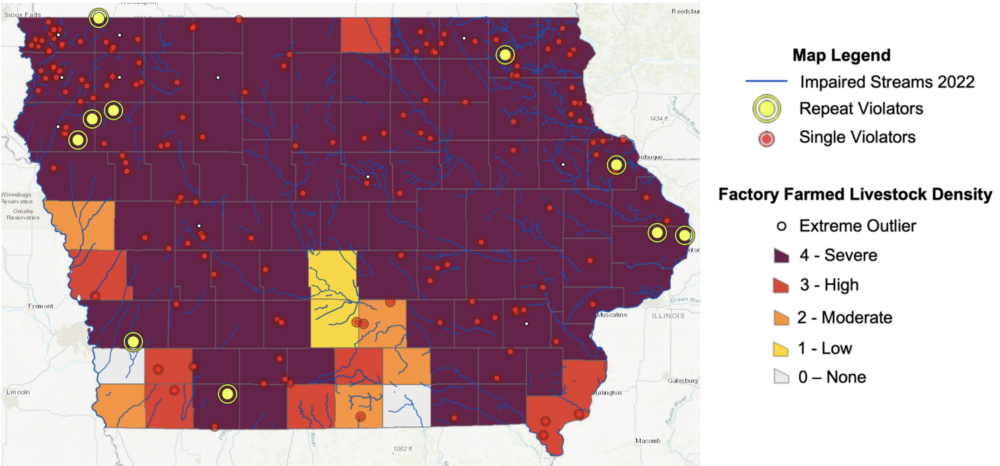New report shows 10 years of agriculture spills into Iowa waterways
December 10th, 2024 by Ric Hanson
A new report analyzed nearly 200 manure spills into Iowa waterways from 2013 to 2023 and found the majority occurred in counties with the highest concentrations of animal feeding operations. The Iowa Capital Dispatch says the report, released Monday by Food and Water Watch, builds on an earlier report from the environment-focused nonprofit that found livestock operations in Iowa produce more than 100 billion pounds of manure each year, the most out of any state in the country.
Northwest Iowa had “particular spill concentration” according to the report, which coincides with findings from the Factory Farm Nation report that found the same region was home to “extreme factory farm concentration.” The report analyzes discharge enforcement reports from the Iowa Department of Natural Resources, which over the 10-year period reported 179 instances of manure discharge in amounts ranging from 500 gallons to 1 million gallons, though not all instances listed an amount. The interactive map associated with the report shows 10 “repeat violators” or farming operations that had multiple spills recorded over the period. Four of the repeat violators are in the northwest region. 
Food and Water Watch estimates the actual number of spills is much higher, since the producers themselves are required to report spills, which the report calls a “clear conflict of interest.”
“This is NOT a comprehensive map of factory farm spills that occurred in Iowa over the study period,” the report said. “For this reason, this map and accompanying report almost certainly undercount the true cost of factory farm spills into Iowa waterways.”
The report also noted more than 4,000 animal feeding operations in Iowa do not have National Pollutant Discharge Elimination System permits. These permits, which regulate entities that discharge pollutants into U.S. waters, are only required on animal feeding operations of a certain size, or with other specific conditions, per the federal Clean Water Act.
Food and Water Watch Iowa Organizer Michaelyn Mankel urged the state to implement more stringent regulations. “Corporate polluters must be held accountable for soiling our water — Iowa legislators must pass the Clean Water for Iowa Act to boost pollution monitoring and ensure accurate fines at factory farms,” Mankel said in a statement.
According to the report, farm operations with recorded spills have been fined less than $730,000 cumulatively, over the 10-year reporting period, despite a reported nearly 2 million fish killed. Mankel called the enforcement penalties “barely a slap on the wrist.”
Eldon McAfee, on behalf of Iowa Cattlemen’s Association and Iowa Pork Producers Association, said the organizations “need more time to review the information used in the analysis,” but plan to review the report.





